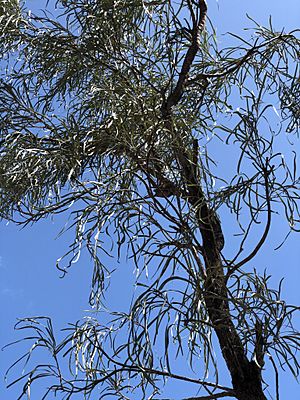Silver oak facts for kids
Quick facts for kids Silver oak |
|
|---|---|
 |
|
| Scientific classification |
|
| Kingdom: | Plantae |
| Clade: | Tracheophytes |
| Clade: | Angiosperms |
| Clade: | Eudicots |
| Order: | Proteales |
| Family: | Proteaceae |
| Genus: | Grevillea |
| Species: |
G. parallela
|
| Binomial name | |
| Grevillea parallela Knight
|
|
| Script error: The function "autoWithCaption" does not exist. | |
Script error: No such module "Check for conflicting parameters".
Grevillea parallela, also known as silver oak, beefwood, or white grevillea, is a tree that grows naturally in northern Australia.
Contents
What Does the Silver Oak Look Like?
This tree is usually small, growing between 4 to 15 meters (about 13 to 49 feet) tall. It has a straight, slender trunk that can be about 40 centimeters (16 inches) wide. The bark is dark, rough, and flaky.
Leaves and Flowers
The leaves of the silver oak are long and narrow, often having up to six lobes. They are a pale green or silvery-grey color and can hang down.
The tree blooms between May and October. It produces beautiful white to creamy yellow flowers that grow in clusters at the ends of the branches. These flowers smell nice, feel waxy, and are packed closely together in cylinder-shaped groups. Each flower cluster is usually about 5 to 10 centimeters (2 to 4 inches) long.
How Was the Silver Oak Named?
The silver oak was first officially described by a botanist (a scientist who studies plants) named Joseph Knight. He wrote about it in 1809 in his book On the Cultivation of the Plants Belonging to the Natural Order of Proteace.
Where Does the Silver Oak Grow?
You can find the silver oak tree in northern Australia. This includes the Kimberley area of Western Australia, the Northern Territory's top end, and parts of northern and central Queensland.
It can grow in many different types of soil, from sandy to clay soils. These soils can come from laterite, sandstone, or granite. The silver oak usually grows in open forests or woodlands. It often grows alongside other trees like bloodwoods and eucalypts, as well as paperbark trees and Planchonia careya.
Images for kids
-
Branch end with inflorescence
See also
 In Spanish: Grevillea robusta para niños
In Spanish: Grevillea robusta para niños
 | John T. Biggers |
 | Thomas Blackshear |
 | Mark Bradford |
 | Beverly Buchanan |















